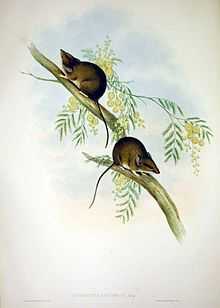White-footed dunnart
| White-footed dunnart | |
|---|---|
 | |
| Conservation status | |
| Scientific classification | |
| Kingdom: | Animalia |
| Phylum: | Chordata |
| Class: | Mammalia |
| Infraclass: | Marsupialia |
| Order: | Dasyuromorphia |
| Family: | Dasyuridae |
| Genus: | Sminthopsis |
| Species: | S. leucopus |
| Binomial name | |
| Sminthopsis leucopus (Gray, 1842) | |
 | |
| White-footed dunnart range | |
The white-footed dunnart (Sminthopsis leucopus) is a marsupial that occurs of Tasmania and Australia. It occurs along the coast and in inner Gippsland and Alpine areas up to 400 metres near Narbethong. The length from snout to tail being 140–200 mm of which head to anus is 70–110 mm and tail 70–90 mm long and with a weight of 19–27 g.
Habitat
The average rainfall of its habitat is between 600–1000 mm per year. Unlike the fat-tailed dunnart, this species requires forest and woodland cover of more than 50% of any square metre of heath understory or mid-story plant species. Other habitats include coastal tussock grasslands, sedgeland and wet heath. This dunnart has an individual range of about 120 square metres for both sexes, although this varies greatly among males, with some males acquiring territories of up to 1200 square metres. Male territories often overlap those of females.
Breeding and social organisation
The white-footed dunnarts mate in summer. The female white-footed dunnart will give birth in September or October, and up to ten joeys may be delivered. The white-footed dunnart will shortly die after the litter is born. After eight weeks old,the young will exit their mothers pouch, continue nursing for a month, then disperse.
Diet
The feeding habit of this 20–30 g species is similar to that of other dasyurids; it is an opportunistic feeder. Diet consists of invertebrates and reptiles of between 1 and 18 mm in length.
References
- ↑ Lunney, D., Menkhorst, P. & Burnett, S. (2008). Sminthopsis leucopus. In: IUCN 2008. IUCN Red List of Threatened Species. Retrieved 28 December 2008. Database entry includes justification for why this species is listed as vulnerable
- Groves, C. P. (2005). Wilson, D. E.; Reeder, D. M, eds. Mammal Species of the World (3rd ed.). Baltimore: Johns Hopkins University Press. p. 35. OCLC 62265494. ISBN 0-801-88221-4.
- Menkhorst, Peter W. (1995). Mammals of Victoria. Oxford Press. pp. 64–65. ISBN 978-0-19-553733-8.
External links
- Mammals of Tasmania – white-footed dunnart
- White-footed dunnart
- Pictures and facts about the white-footed dunnart
